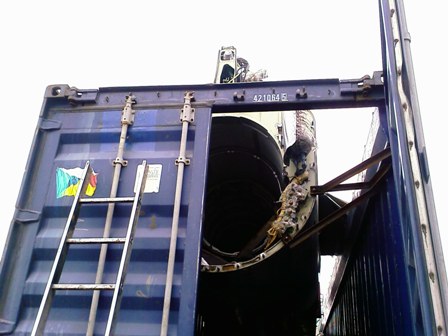Difference between revisions of "Aeroplane (parts)"
| Line 1: | Line 1: | ||
{{Infobox_Machinery | {{Infobox_Machinery | ||
| − | | image = | + | | image = IMG_0830.jpg |
| origin = Various | | origin = Various | ||
| stowage factor = - | | stowage factor = - | ||
Revision as of 13:48, 16 November 2016
| Infobox on Aeroplane (parts) | |
|---|---|
| Example of Aeroplane (parts) | |
| Facts | |
| Origin | Various |
| Stowage factor (in m3/t) | - |
| Humidity / moisture | - |
| Ventilation | - |
| Risk factors | See text |
Aeroplane (parts)
Description/shipment/storage
Light Aircraft parts
Packed in cases. They are shipped in the partially dismantled condition and owing to the light construction and size of the cases require very careful handling to avoid damage. Sling by both ends, placing the slings in positions which, ordinarily, are marked on the cases and adjusting their lengths so that the case is level and not tilted when slung, using spreaders to avoid crushing the upper edges of the case. Stow on a solid and perfectly level flat making provisions where necessary for reeving slings underneath the case for discharging without lifting or tilting the case. Secure the chock off well with suitable packages. Aircraft may also be carried in knockdown form within containers. Particular care should be taken in securing the parts without stressing the fuselage and wings.
Obviously, aircraft parts are also shipped in (open top) containers
Risk factors
- Moisture damage
- Mechanical damage












